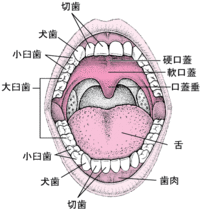口
口, X53E3 is unicode character number 21475, KanjiLiberal.
In Japanese, 口 can be pronounced as "kuchi" and mean mouth.
At site nihongomaster, 口 appears as kanji number 845
[4].
Many other Unicode characters have similar drawing and are easy to confuse each other.
⼝,⼞,ロ,口,ロ
The 5 unicode characters are similar.
All of them, at the first glance, look as rectangles.
Some programming is necessary to identify each of these characters.
Their Utf8 encoding can be revealed with PHP program du.t; command
php du.t ⼝⼞ロ口ロ
produces the following output:
⼝⼞ロ口ロ
The array has 15 bytes; here is its splitting:
e2 bc 9d e2 bc 9e e3 83 ad e5 8f a3 ef be 9b
array(5) {
[0]=>
string(3) "⼝"
[1]=>
string(3) "⼞"
[2]=>
string(3) "ロ"
[3]=>
string(3) "口"
[4]=>
string(3) "ロ"
}
Unicode character number 12061 id est, X2F1D
Picture: ⼝ ; uses 3 bytes. These bytes are:
xE2 xBC x9D in the hexadecimal representation and
226 188 157 in the decimal representation
Unicode character number 12062 id est, X2F1E
Picture: ⼞ ; uses 3 bytes. These bytes are:
xE2 xBC x9E in the hexadecimal representation and
226 188 158 in the decimal representation
Unicode character number 12525 id est, X30ED
Picture: ロ ; uses 3 bytes. These bytes are:
xE3 x83 xAD in the hexadecimal representation and
227 131 173 in the decimal representation
Unicode character number 21475 id est, X53E3
Picture: 口 ; uses 3 bytes. These bytes are:
xE5 x8F xA3 in the hexadecimal representation and
229 143 163 in the decimal representation
Unicode character number 65435 id est, XFF9B
Picture: ロ ; uses 3 bytes. These bytes are:
xEF xBE x9B in the hexadecimal representation and
239 190 155 in the decimal representation
Phonetic
Character 口 can be pronounced as "kuchi"[5].
Graphic
Character 口 appears as a rectangle; this rectangle may be slightly deformed, dependently on the software, used to observe it. Five other Unicode characters (⼝,⼞,ロ,ロ) have similar shape.
Semantic
Character 口 may mean "mouth" [5]
Examples
入口 , でいりぐち ("Iriguchi"), entrance [6]
Confusion
口 (X53E3) is highly confusional character.
Even a native Japanese speaker, looking at characters
⼝,
⼞,
ロ,
口,
ロ,
cannot answer:
which of them is X2F1D (KanjiRadical)?
which of them is X2F1E (KanjiRadical)?
which of them is X30ED (Katkana "ro")?
which of them is X53E3 (KanjiLiberal)?
which of them is XFF9B ( Character from the UnicodeBottom table)?
The manuals on Japanese, as well as dictionaries (Jishos) usually ignore this confusion.
Those, who learn Japanese, have to investigate such a cases by themselves.
Only one of the 5 characters, 口, X53E3, is qualified as KanjiLiberal.
Perhaps, namely this character should be used for generation of Japanese texts.
References
- ↑ https://commons.wikimedia.org/wiki/File:Australien-Krokodil.JPG English: Australian freshwater crocodile (Crocodylus johnsoni) Author Pbuergler Photo taken in Zoo Basel (Switzerland). Aufnahme: Zoo Basel (Schweiz)
- ↑ https://en.wikipedia.org/wiki/Mouth A freshwater crocodile at Basel Zoo in Switzerland In animal anatomy, the mouth, also known as the oral cavity, buccal cavity, or in Latin cavum oris
- ↑ https://www.msdmanuals.com/ja-jp/ホーム/18-口と歯の病気/口の生物学/口の生物学 口の生物学 執筆者: Rosalyn Sulyanto , DMD, MS, Harvard School of Dental Medicine and Boston Children's Hospital 最終査読/改訂年月 2017年 10月 ここをクリックするとプロフェッショナル版へ移動します 本ページのリソース
- ↑ https://www.nihongomaster.com/dictionary/kanji/845 口 3 Strokes Radicals: 囗 JLPT Level 5 Definition of 口 mouth // Readings On'Yomi (音読み) Kun'yomi (訓読み) コウ ク くち Popular Words With This Kanji 人口, じんこう population, common talk// 口, くち mouth, opening, hole, gap, orifice, mouth (of a bottle), spout, nozzle, mouthpiece, gate, door, entrance, exit, speaking, speech, talk (i.e. gossip), taste, palate, mouth (to feed), opening (i.e. vacancy), available position, invitation, summons, kind, sort, type, opening (i.e. beginning), counter for mouthfuls, shares (of money), and swords// 窓口, まどぐち ticket window, teller window, counter, contact person, point of contact// 口座, こうざ account (e.g. bank)// 入口, 入り口, いりぐち, いりくち, はいりぐち, はいりくち entrance, entry, gate, approach, mouth// 入口, 入り口, いりぐち, いりくち, はいりぐち, はいりくち entrance, entry, gate, approach, mouth// 大口, おおぐち, おおくち big mouth, boastful speech, tall talk, large amount, large sum// 河口, 川口, かこう, かわぐち mouth of river, estuary// 河口, 川口, かこう, かわぐち mouth of river, estuary// 悔しい, 口惜しい, 悔やしい, くやしい, くちおしい vexing, annoying, frustrating, regrettable, mortifying // ..
- ↑ 5.0 5.1 https://ja.wikipedia.org/wiki/口 口(くち)は、消化管の最前端である。食物を取り入れる部分であり、食物を分断し、把持し、取り込むための構造が備わっていると同時に、鼻腔と並んで呼吸器の末端ともなっており、発声器官の一部でもある。文脈により口腔(こうこう)とも言う。なお口腔の読みの例外として、日本の医学界においては(こうくう)を正式とする。 生物学に限らず、一般に穴等の開口部を指して口と呼ぶ。このため、「口」は様々な慣用句や比喩表現に使われる(後述の「通念」を参照)。
- ↑ https://nihongoichiban.com/2011/05/01/jlpt-vocabulary-入口/ Vocabulary Card – 入口 – iriguchi MAY 1, 2011 BY NICOLAS LEAVE A COMMENT Furigana: いりぐち Romaji: iriguchi Meaning: entrance
Keywords
Japanese, Kanji, KanjiConfudal, KanjiLiberal, KanjiRadical, Unicode, SomeU, ⼝ (X2F1D), ⼞ (X2F1E), ロ (X30ED), 口 (X53E3), ロ (XFF9B)

